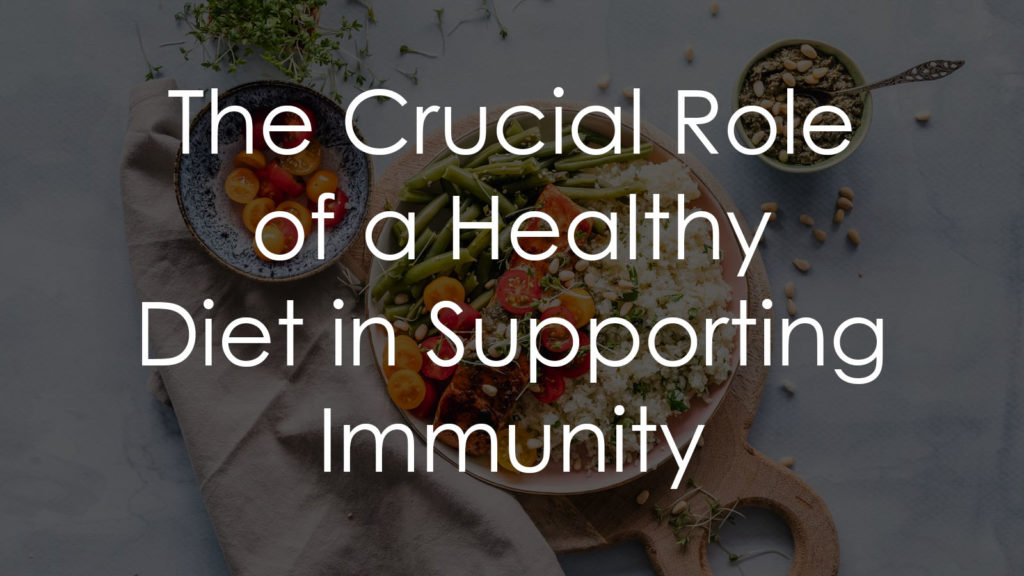A healthy diet plays a pivotal role in bolstering the body’s immune system, which serves as a frontline defense against infections, pathogens, and diseases. By providing essential nutrients, antioxidants, and bioactive compounds, a balanced and nutrient-rich diet can help optimize immune function, enhance resilience, and reduce the risk of illness. In this article, we will explore the key components of a healthy diet that contribute to maintaining immunity.

1. Nutrient-Rich Foods:
A diet rich in essential nutrients is fundamental for supporting immune health. Key nutrients that play vital roles in immune function include:
- Vitamins: Vitamins such as vitamin C, vitamin D, vitamin E, and vitamin A play crucial roles in supporting immune responses, enhancing the function of immune cells, and protecting against infections. Good food sources of these vitamins include citrus fruits, berries, leafy greens, fatty fish, nuts, seeds, and fortified foods.
- Minerals: Minerals like zinc, selenium, iron, and copper are essential for proper immune function and antibody production. Foods rich in these minerals include lean meats, shellfish, whole grains, legumes, nuts, seeds, and dark leafy greens.
- Protein: Protein is necessary for building and repairing tissues, including immune cells. Incorporating lean sources of protein such as poultry, fish, eggs, dairy products, legumes, and tofu into your diet can help support immune function.
2. Antioxidant-Rich Foods:
Antioxidants are compounds that help neutralize harmful free radicals and reduce oxidative stress in the body. Consuming a variety of antioxidant-rich foods can help protect immune cells from damage and strengthen the body’s defense mechanisms. Some antioxidant-rich foods include:
- Fruits: Berries (such as strawberries, blueberries, and raspberries), citrus fruits (such as oranges and grapefruits), kiwi, and papaya are excellent sources of vitamin C and other antioxidants.
- Vegetables: Dark leafy greens (such as spinach and kale), bell peppers, broccoli, carrots, and sweet potatoes are packed with vitamins, minerals, and phytonutrients that support immune health.
- Nuts and Seeds: Almonds, walnuts, sunflower seeds, and pumpkin seeds are rich in vitamin E, zinc, and selenium, as well as antioxidants like flavonoids and polyphenols.
3. Healthy Fats:
Incorporating healthy fats into your diet is essential for supporting immune function and reducing inflammation. Omega-3 fatty acids, in particular, have anti-inflammatory properties and play a role in modulating immune responses. Good sources of healthy fats include:
- Fatty Fish: Salmon, mackerel, trout, sardines, and herring are rich in omega-3 fatty acids, which can help reduce inflammation and support immune health.
- Nuts and Seeds: Almonds, walnuts, chia seeds, and flaxseeds are excellent sources of plant-based omega-3 fatty acids and other beneficial fats.
- Avocado and Olive Oil: Avocado and olive oil are rich in monounsaturated fats, which have anti-inflammatory properties and can help support immune function.
4. Hydration:
Staying hydrated is essential for maintaining optimal immune function and overall health. Adequate hydration helps support the function of immune cells, aids in the removal of toxins and waste products from the body, and supports proper digestion and nutrient absorption. Aim to drink plenty of water throughout the day and incorporate hydrating foods such as fruits, vegetables, and herbal teas into your diet.
5. Probiotic-Rich Foods:
Probiotics are beneficial bacteria that promote gut health and play a key role in regulating immune responses. Consuming probiotic-rich foods can help maintain a healthy balance of gut microbiota and support immune function. Some examples of probiotic-rich foods include:
- Yogurt: Choose plain, unsweetened yogurt with live and active cultures to maximize probiotic benefits.
- Kefir: A fermented milk drink that contains a variety of beneficial probiotic strains.
- Sauerkraut: Fermented cabbage that is rich in probiotics and fiber.
- Kimchi: A traditional Korean fermented vegetable dish that contains probiotics and is rich in vitamins and antioxidants.
Conclusion
A healthy diet rich in nutrient-dense foods, antioxidants, healthy fats, and probiotics is essential for supporting immune health and reducing the risk of illness. By prioritizing a balanced and varied diet that includes a wide range of fruits, vegetables, lean proteins, whole grains, and healthy fats, individuals can provide their bodies with the essential nutrients and compounds needed to maintain a robust immune system and enjoy optimal health and well-being.